6 Hikes Near Historic Towns
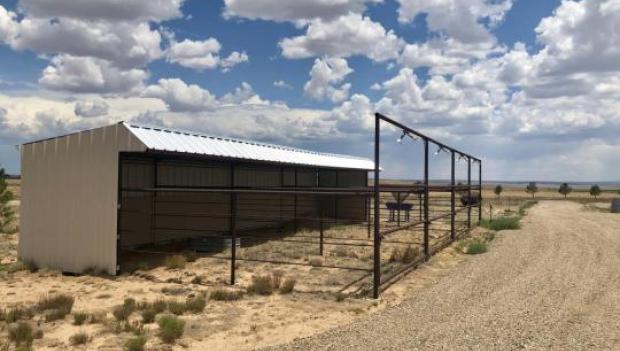 Looking for a fun way to motivate you for a day on the trail? Try choosing a hike with historical significance. Below we list six hikes that are near towns and places of importance to the development of our country. With each step on the trail, you’ll be taking a step back in time and learning something new about our country’s history. Information on camping options is also included if you want to turn your historical hike into a trip.
Looking for a fun way to motivate you for a day on the trail? Try choosing a hike with historical significance. Below we list six hikes that are near towns and places of importance to the development of our country. With each step on the trail, you’ll be taking a step back in time and learning something new about our country’s history. Information on camping options is also included if you want to turn your historical hike into a trip.
1. Explore One of Florida’s First Cities - Blackwater Heritage State Trail near Milton, Florida
At a Glance:
Length: 9 miles
Elevation: 245 ft
Type: In and Out
Difficulty: Easy
Historical Significance: The historic town of Milton was one of the first cities established in Florida
Located in the western Panhandle, the city of Milton was one of the first cities established in the state. Incorporated in 1844, the town dates back to the early 19th Century, presumably as a mill town. It served as an important transportation artery for goods such as timber, brick, and naval ship-building supplies.
The trail winds through Milton and out to the countryside with wooden bridge crossings over creeks. Designated as a National Recreation Trail, this paved trail is popular for walking, running, biking, and skating. For hikers interested in adding onto their trip, the trail extends to join the U.S. Navy's 1.5-mile Military Heritage Trail to the north.
Where to Stay: Blackwater River State Park
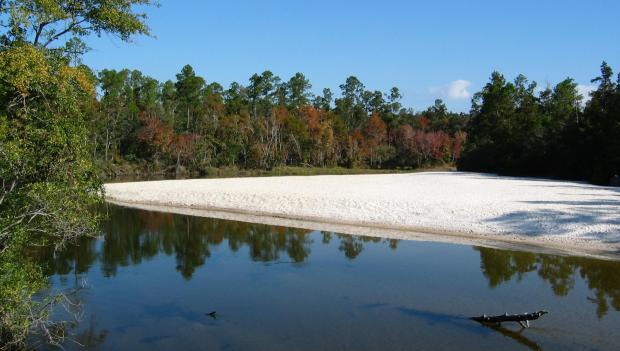
Recommended: Glamp It Up at Florida State Parks
2. Visit an Old WWII POW Camp - Sunset Rocks Trail near Gardners, Pennsylvania
At a Glance:
Length: 7.8 miles
Elevation Gain: 1,220 ft
Type: Loop
Difficulty Rating: Moderate
Historical Significance: POW camp ruins from WWII
Tucked away in Michaux State Forest, adjacent to Caledonia State Forest, is a trail that takes you to Camp Michaux. Originally the area was used to mine iron ore, but was redeveloped into a Civilian Conservation Corps during the Great Depression. In 1942, during World War II, the camp was again repurposed for use as the Michaux Prisoner of War Camp.
Sunset Rocks Trail, sometimes called Little Rocky Ridge, takes you to the stone ruins of a barn that was a part of the POW camp. This trail also offers great views of the surrounding hills and valleys. Visitors can park at Pine Grove Furnace State Park near the Iron Furnace.
Where to Stay: Caledonia State Park
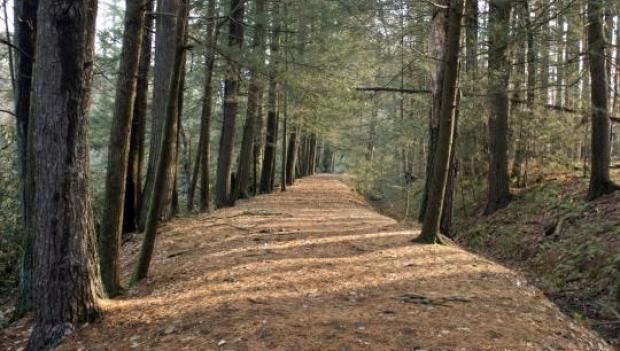
3. Explore an Abandoned Gold Rush Town - Golden Open Space Mesa Trail near Placitas, New Mexico
At a Glance:
Length: 2.1 miles
Elevation Gain: 118 ft
Type: Loop
Difficulty Rating: Moderate
Historical Significance: Ghost town of Golden, the first gold rush town west of the Mississippi
The abandoned town of Golden was originally called Real de San Francisco, inhabited by Native Americans and Spaniards. When gold was discovered in the area in 1825, the town experienced a boon and was renamed Golden. The population growth occurred years before the California and Colorado gold rushes, making Golden the first gold rush town west of the Mississippi River. However, the gold yield was not what speculators expected and the population quickly dwindled. Today the town of Golden stands at 37 souls, but old wood farms and brick structures dotting the area evidence the town’s gold rush past.
The Golden Open Space Trail is adjacent to the town, about a 15 minutes drive west. Hiking this area is a great way to get a sense of the vast arid land that settlers faced when the town boomed. The hike is an easy loop among the juniper and pinyon trees before it descends into the arroyo (riverbed).
Where to Stay: Cuervo Mountain RV Park and Horse Hotel

4. Check Out Two Abandoned Logging Towns - Possum Walk Trail near Bay Saint Louis, Mississippi
At a Glance:
Length: 6.2 miles
Elevation Gain: 49 ft
Type: In and Out
Difficulty Rating: Easy
Historical Significance: Ruins of two 19th Century towns
This hike is considered one of the best in the state for historical sightseeing. It guides hikers through two deserted communities, Possum Walk and Logtown, both founded in the early part of the 19th Century as logging towns. Informative placards give a glimpse into the towns’ haydays, as well as information on native plants and animals. Hikers can see evidence of old cemeteries and remnants of the historic Dummy Line railroad. The trail is mostly flat and considered suitable for all ages and levels of fitness.
Where to Stay: Buccaneer State Park
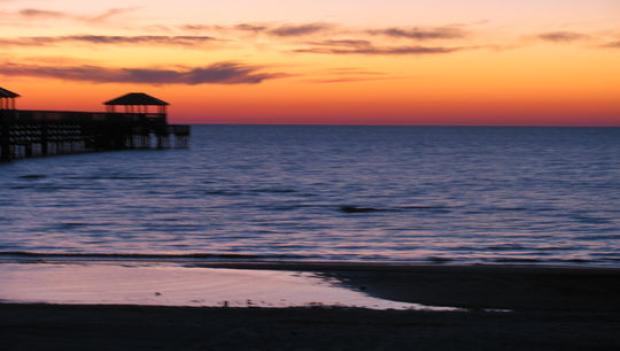
Recommended: 7 Reasons to Visit Mississippi This Summer
5. Visit this Oregon Gold Rush Town - Quarry Trail to Old Catholic Wagon Trail in Jacksonville, Oregon
At a Glance:
Length: 1.7 miles
Elevation Gain: 164 ft
Type: Loop
Difficulty Rating: Easy
Historical Significance: Entact gold rush town that is a National Historical Landmark District
The area surrounding Jacksonville in south-western Oregon was originally home to the Upland Takelmas - a native American tribe. The area saw a sudden influx of gold miners when gold was first discovered nearby in 1851. Today, most of Jacksonville is designated a National Historic Landmark since so many of the original buildings have been preserved. In fact, over 100 structures are included in the National Register of Historic Places, earning the town the designation as a National Historical Landmark District.
There are a number of trails in and around town. A favorite is the Quarry Trail to Old Catholic Wagon Trail, which features a beautiful forest setting and circumnavigates the cemetery. It’s a short trail with little elevation gain, making it accessible to most hikers.
Where to Stay: Valley of the Rogue State Park
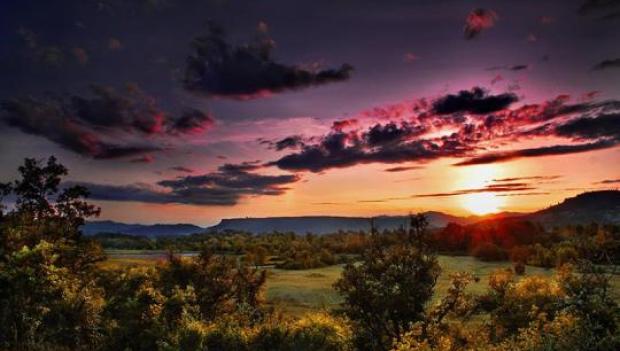
6. Follow in the Footsteps of Famous Explorers - Lewis and Clark State Park Loop near Onawa, Iowa
At a Glance:
Length: 2.0 miles
Elevation Gain: 22 ft
Type: Loop
Difficulty Rating: Easy
Historical Significance: Stopping point for the Lewis and Clark expedition
Lewis and Clark, the famed explorers who were commissioned by President Thomas Jefferson to explore the American northwest purchased from France, stayed in this exact spot in Iowa in August 1864. The park is located on the shores of Blue Lake and contains extensive information about the explorers’ significant expedition into the new U.S. territory. There are replicas of Lewis and Clark’s keelboat, pirogue, dug-out canoe, The Iron Boat, and a bull boat - different types of watercraft needed to explore the wild rivers and tributaries. The hike itself is a loop around the environs of the park, along part of the lake, and is rated as easy.
Where to Stay: Lewis and Clark State Park
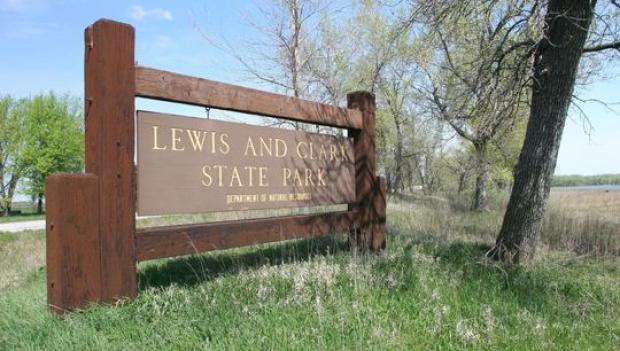
Recommended: 9 Fantastic Forest Regions to Explore